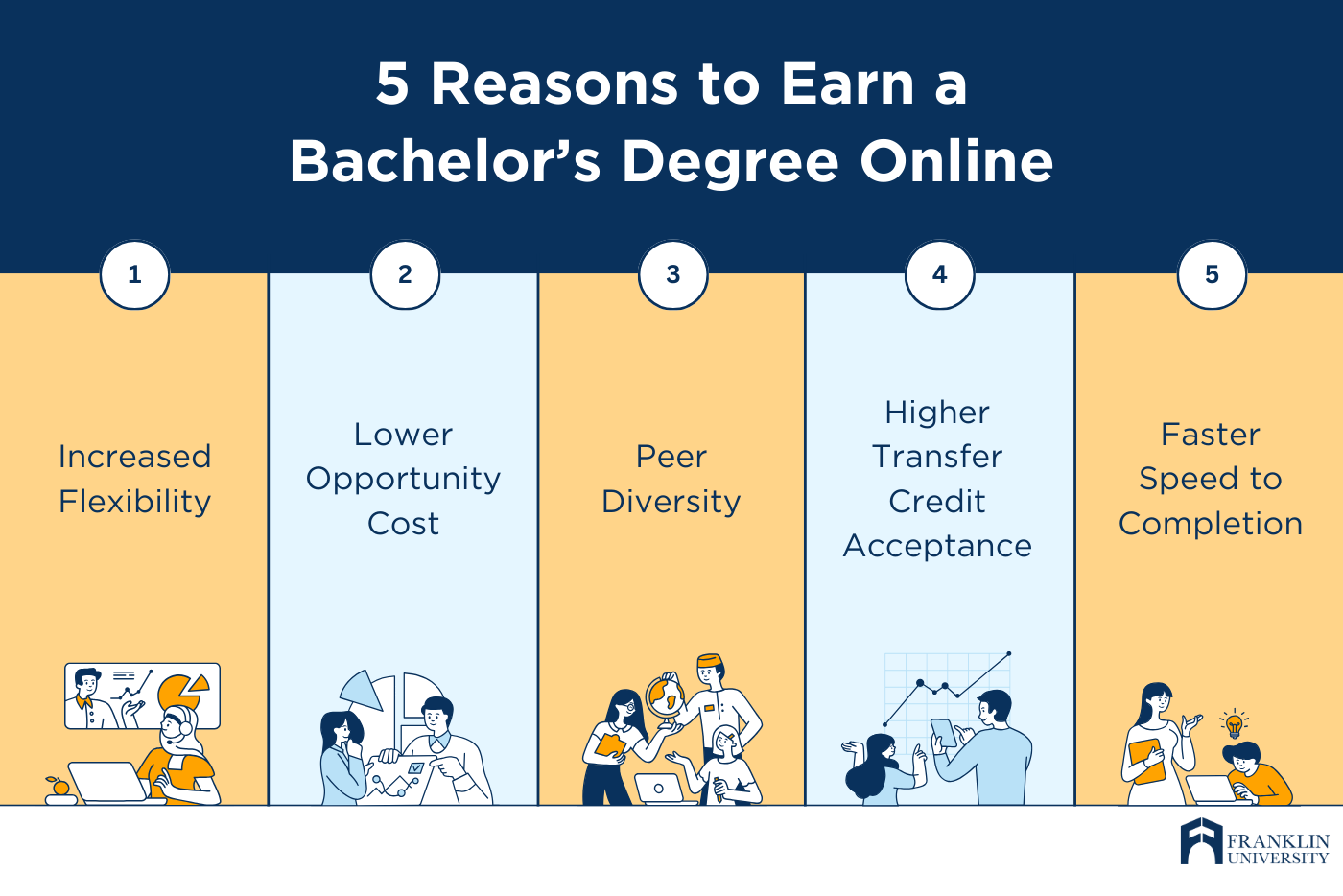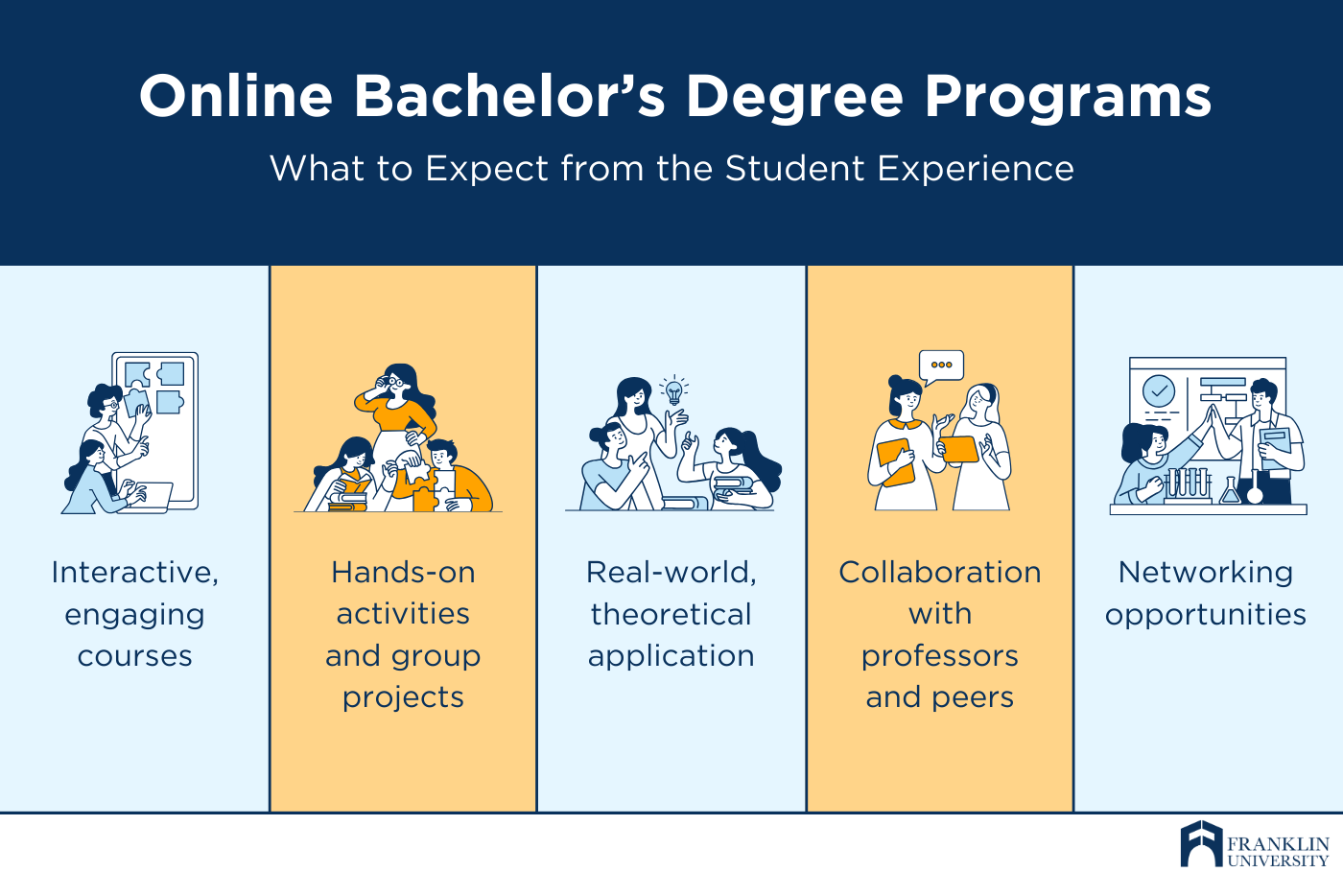Request Information
We're Sorry
There was an unexpected error with the form (your web browser was unable to retrieve some required data from our servers). This kind of error may occur if you have temporarily lost your internet connection. If you're able to verify that your internet connection is stable and the error persists, the Franklin University Help Desk is available to assist you at helpdesk@franklin.edu, 614.947.6682 (local), or 1.866.435.7006 (toll free).
Just a moment while we process your submission.

Can You Get a Bachelor’s Degree Online?
Job stability, a great salary, meaningful work and time to have a life outside of work. Is that so much to ask? Hardly.
While there are no guarantees you can easily have it all, there is something you can do to improve your chances: earn a top-quality, online bachelor’s degree from a college or university that specializes in online learning.
There’s no question that earning a bachelor’s degree can pay off. According to the U.S. Bureau of Labor Statistics (BLS), people with a bachelor’s degree have a median annual salary of $69,368. Compare that to the $42,068 median annual salary for those with only a high school diploma and it’s no wonder the number of people earning a bachelor’s continues to grow.
In fact, according to labor market analytics firm Lightcast, bachelor’s degree completions rose 14.8% between 2012 and 2021, with the majority of these completions coming from online programs (+94.5%).
Can You Get a Bachelor’s Degree Online? Absolutely. Here’s Why You Should.
So, what makes an online bachelor’s degree program so attractive? Perhaps the biggest reason is the convenience and flexibility of classes. The inherent flexibility of online degree programs allows students of all ages and stages (including those who fall into the “Some College, No Degree” (SCNC) population) to go back to college and finish their degree–without having to push pause on their career.
Graphic: update the numbers
864,000 SCNC students re-enrolled in 2021/22
40.4 million have completed some college but have not finished a degree
Delete the age information; the newest report supports a younger population of 20-24 and also cautions against the validity of age information
Here’s a closer look at why working professionals choose an online bachelor’s degree program. More importantly, here’s how you can follow in their footsteps and get your degree, no matter how long it’s been since you were in college.
5 Reasons to Earn a Bachelor’s Degree Online
If you need to balance your education, professional and personal life all at the same time, it’s hard to beat an accredited online university’s bachelor’s degree program for these 5 reasons:

1. Increased Flexibility
Online bachelor’s degree programs are designed to work with your schedule. From evening classes to recorded lectures to rolling start dates, you get to decide when and how you earn your bachelor’s degree.
2. Lower Opportunity Cost
While tuition costs vary widely, there’s one truth about affordability: You don’t have to quit your job. Since you can still earn your full-time income while attending classes, you won’t have to sacrifice income while going to school. Plus, you’ll save on transportation costs, living expenses and other fees related to once-traditional, on-campus degree programs.
When it comes to paying for school, grants are among your best options. But do you know how to find them? Remove the guesswork by downloading this free guide
3. Peer Diversity
Some working adults may feel apprehensive about joining a classroom full of students ages 18-22. No problem when you get your bachelor’s degree through an online program. With an online bachelor’s degree, you’re immersed in a rich learning environment with students of all ages, backgrounds and geographies.
4. Higher Transfer Credit Acceptance
Many online bachelor’s degree programs accept more transfer credit than their on-campus counterparts. While most on-campus programs are built for the typical four-year student, online degrees are especially welcoming to associate degrees, certificates and past college credits. For example, at Franklin University, you can transfer up to 94 credits into a bachelor’s degree program. That equals nearly three years worth of college credit!
5. Faster Speed to Completion
In an online bachelor’s degree program, you get to set the pace for how quickly you earn your degree. Since online courses are often 6-12 weeks (compared to a standard 15-week semester) you can earn credits in less time.
Online Bachelor’s Degree Program: How It Works
If you’re someone who has never enrolled in an online university, you might have a hard time imagining what it’s like to complete a bachelor’s degree 100% online. While every school is unique and every course is different, here’s a general idea of what you can expect from an online bachelor’s degree program.
Scheduling courses
Many online students choose to take one course at a time, but you can do more if you want. Online courses typically start every 6 weeks, so you don’t need to wait a full semester before registering for your next session.
Course formats
There are two types of online courses: synchronous and asynchronous. Synchronous courses require you to be logged in at a specific time for class, much the same as attending an on-campus class. Asynchronous courses are self-directed, which means they don’t have specific meeting times. Typically, online bachelor’s programs offer a combination of both types of courses, giving you more flexibility as a busy, working adult.
Meet sessions
In synchronous courses, you’ll participate in live lectures and group discussions. Most often, these are scheduled once or twice a week, depending on the course. These sessions are always recorded, which is great because you might have the occasional scheduling conflict. It’s also great if you want to revisit the content at a later date.
Assignments and projects
You’ll complete a wide variety of solo and group projects. Typically, online assignments use industry tools and strategies to solve real-world challenges. You’ll also likely participate in formal presentations of your work using some type of technology like video conferencing or video/audio recording.
Evaluation
You will have tests and exams just like in-person classes. The biggest difference is that these tests and exams are likely to be spread out over the course of the course rather than just as a midterm and final exam. Shorter form assessments make it easier to course correct, too, if necessary, making online bachelor’s degree programs ideal for anyone who may be struggling even just a bit.
Online Bachelor’s Degree vs. On-Campus Bachelor’s Degree
First and foremost, the bachelor’s degree itself is the same whether you earn it online or on-campus. The only difference is in how you take your classes.
Unless you attend an online-only school, a recruiter or employer won’t know that you didn’t attend on-campus classes. Not only that, nobody really cares because online degrees are more respected than ever.
And, as online bachelor’s degree programs have advanced technologically, the learning experience is as good (some say even better) than in-person classes.
What to Expect In an Online Bachelor’s Degree Program

- Interactive and engaging courses
- Hands-on activities and group projects that help you translate theory into real-world practice
- Video conference-style collaboration with professors and peers
- Networking opportunities with industry mentors, employers and professional organizations
If you want to take advantage of these benefits, make sure you look for instructor-led, student-centered online colleges. A competency-based bachelor’s degree program will lack these traits. And, because it’s completely self-paced, you may find yourself in a not-so-fun solitary learning environment.
Tips for Being Successful in an Online Bachelor’s Degree Program
An online bachelor’s degree is just as much of a commitment as an on-campus program. In other words, don’t expect it to be easier just because you’re earning an online degree.
Here are 6 DOs and DON’Ts to empower you for success:
- DO create a dedicated learning space, whether it’s an office or even just a specific table. This will help you put yourself in a productive mindset.
- DON’T forget to plan your schedule around your courses and assignments. Set aside enough time each week—approximately 20 hours—to get your coursework done.
- DO make sure you have access to the right technology, including a high-speed internet connection and the proper software or applications required for your courses.
- DON’T go it alone. Find someone to hold you accountable, whether that’s your spouse, a friend, a classmate or all three.
- DO plan ahead. You’ll only hinder your progress if you let the flexibility of your classes cause you to wait until the last minute to complete your assignments.
- DON’T wait until you have a problem. Instead, make an effort to schedule time with faculty and peers outside of scheduled meet sessions.
What Is the Right Online Bachelor’s Degree for You?
The right program is the one you’ll finish (and, of course, the one that gives you a quality education you can be proud of).
Now that you understand the benefits of getting your bachelor’s degree online, it’s up to you to find the best program for your interests, goals and career ambitions.
If you want a student experience similar to a traditional program and with all of the advantages of an online degree program, find a student-centered, built-for-the-busy institution like Franklin University.
But, no matter which program you choose, just be sure it offers you the flexibility, relevant courses and in-demand skills you need to succeed now and in the future.





